| Srl | Item |
| 1 |
ID:
099659
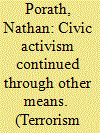

|
|
|
|
|
| Publication |
2010.
|
| Summary/Abstract |
This article explores the relationship between civil society and terror-violence. It argues that terrorism should be understood as "civic activism continued through other means." This allows us to distinguish it from state-terror. The article then explores the theme with data drawn from the political situation in the south of Thailand focusing on some recent events in which local Thai Malay-Muslims have protested against military presence. The paper also provides a brief history of the development of belligerent separatist groups in the area showing that they emerged after dissatisfaction with 20th century Thai civil-societal possibilities.
|
|
|
|
|
|
|
|
|
|
|
|
|
|
|
|
| 2 |
ID:
099654
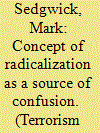

|
|
|
|
|
| Publication |
2010.
|
| Summary/Abstract |
The ubiquity of use of the term "radicalization" suggests a consensus about its meaning, but this article shows through a review of a variety of definitions that no such consensus exists. The article then argues that use of the term is problematic not just for these reasons, but because it is used in three different contexts: the security context, the integration context, and the foreign-policy context. It is argued that each of these contexts has a different agenda, impacted in the case of the integration agenda by the rise of European "neo-nationalism," and so each uses the term "radical" to mean something different. The use of one term to denote at least three different concepts risks serious confusion. The proposed solution is to abandon the attempt to use "radicalization" as an absolute concept.
|
|
|
|
|
|
|
|
|
|
|
|
|
|
|
|
| 3 |
ID:
099656
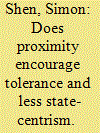

|
|
|
|
|
| Publication |
2010.
|
| Summary/Abstract |
After 9/11, the exact perception among young Chinese of terrorism and security is little known to the world. What are their views and how are they formed? Are there any obvious differences in perception between young Chinese in different parts of China? What causes this disparity, if there is any? Are these differences intentionally created by the Chinese party-state top-down, or are they only nurtured in a bottom-up, decentralized manner? Using primary research findings obtained from original quantitative surveys and qualitative analyses, this article attempts to offer an empirical answer to these questions. The article is arranged in three sections. The first provides a review of the literature on the topic and describes the research methodology used. The second offers an analysis of our survey findings on how university students from two different cities, Shanghai and Xi'an, evolve distinctive perceptions about terrorism and security. The third section explains the framework used to analyse our findings, which can be summarized as "the nearer, the more tolerant and the less state-centric" towards terrorist-related topics. A conclusion suggests the possible roles of-and wake-up calls for-the Chinese state and the media in light of these disparate perceptions.
|
|
|
|
|
|
|
|
|
|
|
|
|
|
|
|
| 4 |
ID:
099657
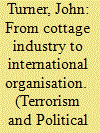

|
|
|
|
|
| Publication |
2010.
|
| Summary/Abstract |
Al Qaeda after the invasion of Afghanistan can now be understood as not only an international terror organisation but an ideology which inspires groups with similar goals of a supranational caliphate. The Al Qaeda ideology draws from long standing historical Islamic concepts that date to the time of Muhammad. The ideologues of the organisation, most notably Ayman al Zawahiri, have cleverly used these ideas and the works of other Islamists to create not just a terror organisation but an ideology designed to unite disparate groups of Islamic radicals around the world.
|
|
|
|
|
|
|
|
|
|
|
|
|
|
|
|
| 5 |
ID:
099658


|
|
|
|
|
| Publication |
2010.
|
| Summary/Abstract |
Observers argue that the business of news is responsible for worsening the coverage of terrorism, but exactly how economic considerations influence coverage is controversial. Based on an analysis of over 1600 articles from The Washington Post and USA Today, we find that concerns about the effects of economic pressures on terrorism reporting are exaggerated. The business climate affects coverage, but the long-term impact of market pressures on coverage is modest. Articles about terrorist violence are increasingly prominent, but coverage of counterterrorism remains robust. Efforts to inoculate the press against the worst excesses of the market are unnecessary.
|
|
|
|
|
|
|
|
|
|
|
|
|
|
|
|
| 6 |
ID:
099661
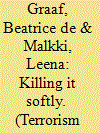

|
|
|
|
|
| Publication |
2010.
|
| Summary/Abstract |
This article seeks to provide a comprehensive analysis of the early demise of Rode Jeugd's initiatives towards a terrorist campaign in the Netherlands. It is concluded that three contextual factors played a crucial role in the process: the openness of the political culture, the setbacks experienced by similar organizations elsewhere (RAF in particular), and the lack of overt repression, combined with effective covert operations carried out by the security forces against the Rode Jeugd. Overall, the case of Rode Jeugd is a prime example of a demonstration of state power not always being the most efficient or even suitable method to combat terrorism.
|
|
|
|
|
|
|
|
|
|
|
|
|
|
|
|
| 7 |
ID:
099660
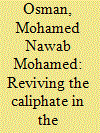

|
|
|
|
|
| Publication |
2010.
|
| Summary/Abstract |
Hizbut Tahrir (HT) is a transnational Islamic movement operating in over forty-five countries. Literature on HT has focused mainly on its activities in Central Asia and Europe. As such, when the HT chapter in Indonesia organized the largest-ever political gathering staged by HT, many observers were caught by surprise. Yet despite the importance of Hizbut Tahrir Indonesia (HTI), little is known about the organization in the English-speaking world. This paper is an attempt to present empirical data on this group. The paper argues that HTI's usage of different mobilization strategies has resulted in its ability to effect policy changes in Indonesia.
|
|
|
|
|
|
|
|
|
|
|
|
|
|
|
|